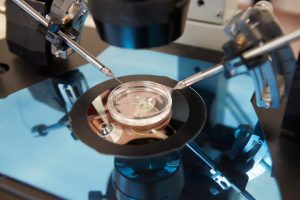There are many factors that can have a positive effect on fertility. These include your daily diet. Research shows that women who watch their weight and follow a Mediterranean diet with plenty of vegetables, vegetable oils, fish and pulses increase their chances of getting pregnant. Some studies also suggest that women undergoing artificial insemination also benefit from such a diet.
Mediterranean Diet Increases Chances of Pregnancy With IVF
In fact, a group of researchers found that women who eat a Mediterranean diet in the six months before artificial insemination have a significantly higher chance of becoming pregnant and giving birth to a living child than women who do not eat a Mediterranean diet. The researchers asked the women about their diet before in vitro fertilization (IVF ) and found that those who ate more fresh vegetables, fruits, whole grains, legumes, fish and olive oil and less red meat were 65-68% more likely to have a successful pregnancy and birth than those who followed the Mediterranean diet the least.
The study, published in Human Reproduction, focused on dietary patterns rather than individual nutrients, foods or food groups. It examined the diets of 244 women using a food frequency questionnaire when they registered for their first IVF treatment at an assisted conception unit in Athens, Greece. The questionnaire asked the women how often they had eaten certain food groups in the previous six months. The results yielded a MedDiet score that ranged from 0-55, with higher scores indicating greater compliance with the Mediterranean diet. The women were between 22 and 41 years old and were not obese (body mass index of less than 30 kg/m2).
The researchers, led by Professor Nikos Yiannakouris from the Department of Nutrition and Dietetics at the Harokopio University of Athens, divided the women into three groups according to their MedDiet score: the first group had scores between 18 and 30, the second between 31 and 35 and the third between 36 and 47. They found that compared to the 86 women in the group with the highest scores, the 79 women in the group with the lowest scores had significantly lower pregnancy rates (29% versus 50%) and live birth rates (26.6% versus 48.8%). When looking at women under the age of 35, the researchers found that each five-point improvement in MedDiet score was associated with an approximately 2.7 times higher likelihood of a successful pregnancy and live birth. In total, 229 women (93.9%) had at least one embryo transferred to the uterus; 138 (56%) had successful implantation; 104 (42.6%) achieved a clinical pregnancy (one that can be confirmed by ultrasound); and 99 (40.5%) gave birth to a live baby.
Further Research and Intervention Studies Needed
Previous work by the research group with the male partners in their study has shown that adherence to the Mediterranean diet can also help improve sperm quality. Overall, these results underline the importance of dietary influences and diet quality on fertility, and support a positive role for the Mediterranean diet in assisted reproduction.
The researchers found no association between diet and the chances of successful pregnancies and live births in women aged 35 years and older. However, their findings support the notion that couples undergoing fertility treatment may benefit from a Mediterranean diet (a diet widely recognized for its positive effects on human health); however, whether the advice to adhere more closely to this traditional diet would improve assisted reproduction outcomes needs to be investigated in future intervention studies.
Further research and intervention studies are clearly needed to clarify the role of dietary quality in assisted reproduction, to uncover the underlying mechanisms and to develop dietary guidelines for women to further improve fertility treatment and success rates.
Nutrition Tips for Women Trying to Conceive
Reduce consumption of foods with trans fatty acids and saturated fatty acids and increase consumption of monounsaturated fatty acids, such as avocados and olive oil. Reduce your intake of animal protein and add more plant protein to your diet. Incorporate more fiber into your daily diet through whole grains, vegetables and fruit. Plant-based sources of iron such as legumes, tofu, nuts and seeds are also important. Take a regular multivitamin supplement that provides valuable ingredients to promote fertility.





